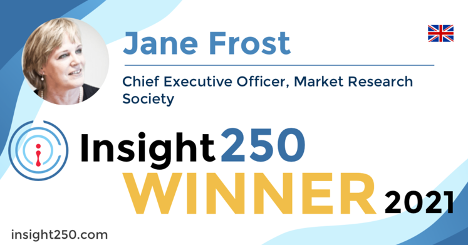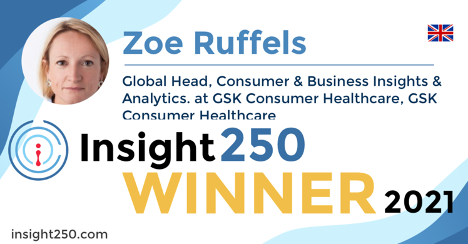


The Insight250 spotlights and celebrates 250 of the world’s premier leaders and innovators in market research, consumer insights and data-driven marketing. The inaugural list was revealed this April and created renewed excitement across the industry whilst strengthening the connectivity of the market research community.
With so many exceptional professionals named to the Insight250 it seems fitting to tap into their expertise and unique perspectives across an array of topics. This weekly series focuses on doing just that; inquiring about the expert perspectives of many of these individuals in a series of short topical features.
This edition features two leading experts who are at the forefront of data insights and consumer intelligence. Zoë Ruffels is the Global Head of Consumer & Business Insights & Analytics for GSK Consumer Healthcare and Jane Frost CBE is the Chief Executive Officer of the Market Research Society (MRS).
As brands advance in their ability to traverse increasingly complex markets to engage increasingly sophisticated consumers, the concept of Intelligence Capital™ is paramount to the data management and analysis of organisations. Developed by MRS, the concept of Intelligence Capital™ (https://www.mrs.org.uk/resources/intelligence-capital) is defined as “the information, evidence and insight an organisation collectively assesses, circulates and acts upon.” This is basically the data-driven evidence across a company that is inventoried, collected, circulated and analysed to guide decisions, set strategy, deliver engagements and drive innovation. For savvy operations, it generally serves as the strategic backbone and is becoming widely considered as important as financial capital and human capital to help a brand thrive.
Crispin: What is Intelligence Capital?
Jane: “Intelligence Capital is a compelling narrative that explains the value of customer insight in strategic rather than transactional language designed to appeal to the c-suite. It is also a framework which describes the skills and the tools required to combine current company operations with new skills to build an asset that will drive competitiveness based firmly on the customer. We hope it will come to be regarded as having the same corporate value, as say human capital.“
Crispin: How is Intelligence Capital used within GSK Consumer Healthcare (GSK CH)?
Zoë: “The fact that customer insight is of strategic advantage is well understood at GSK CH. Therefore we go beyond ‘talking’ about consumer centricity; we firmly believe that insight and analytics that puts ‘humans’ at the heart of strategy and decision making is a competitive advantage. This is also reflected in the fact that our Consumer and Business Insights and Analytics leaders have a well-established and appreciated position at senior management ‘tables.’”
Crispin: What has proved most successful at GSK CH in using the Intelligence Capital principles?
Zoë: “GSK CH places significant value on insights and analytics and as such invests in ensuring that our people are continuously developed and at the forefront of the profession. This is supported by the powerful International Affiliation we have with the Market Research Society. Delivering better everyday health with humanity is our guiding purpose. For our brands, this means connecting in deeper ways to the changing needs of people and their health. We call it “Brands with Humanity.” With this approach, we are recognising the whole person – it is about understanding what their everyday health needs might be, rather than just looking at the condition itself. We want to speak to a person on an individual level and go beyond the product and condition. This example alone illustrates the role of “Human Understanding” at GSK CH. We combine inclusive, timely and culturally resonant human truth with cutting edge creativity and technology. Hence, we can connect and provide innovation and experience that are needed and highly valued by the business.”
Crispin: Data is being described as the new “oil,” or the “holy grail,” but how do you balance data and insight to deliver actionable results?
Jane: “People regard data acquisition as an end in itself. This is completely wrong, data is only useful if it is part of a process which leads to actions that support organisational delivery or change. The focus should be on smart, not big data – stuff you can use. It is just one of the deployable sources of insight at a manager’s command.
Zoë: “I do believe that data can be considered an ‘oil’ however in GSK CH we talk about being ‘data-fueled and insight-led.’ To ensure that the analysis of data and the generation of actionable insights are fully integrated, we have brought these two types of skills together into teams that serve our businesses in an integrated fashion. This does, however, require a rethinking of the skills needed to ensure that the two previously ‘separate’ disciplines can ‘talk’ to each other. It demands traditional insight managers to be fully data literate and analytically competent and analysts to be able to consider the ‘so what.’ In my opinion, individuals that can transcend both are still in short supply in the industry.”
Crispin: Is data without insight useless? And is insight without data dangerous?
Zoë: “Data and the science that surrounds it is not an end in itself and really only tells you what is happening. It does not tell you why and frankly is only as good as the questions you ask of it and the inputs used. Without a solid more qualitative understanding of humans and their behaviours, it is almost always impossible to explain the ‘why’ so indeed data without insight is useless. Equally insights without data are simply not as powerful but we have to remember that ‘data’ comes in many forms. I have seen many instances when we have seemingly powerful insights, but the organisation does not mobilise behind them because of the lack of data to support them.”
Crispin: Jane, talk about the MRS slogan “Evidence Matters” – why is this important?
Jane: “Decisions taken without evidence should by now be anachronistic, unfortunately that isn’t true and in so many cases, particularly in public policy, it can be an afterthought. The principle is much touted in government circles “following the science” in their terminology. It is important to remember that every piece of evidence can have multiple interpretations and that is why there needs to be transparency about the evidence source as well as trust that evidence has been gathered appropriately and interpreted honestly. Accreditation to the MRS Code of Conduct is the guarantee of this to clients, their stakeholders and the public.”
Crispin: Zoë, you’ve talked previously about the “Science of the what vs. the Science of the why” – tell me more about how you apply this at GSK CH?
Zoë: “I strongly believe that there is a place for data and data science but equally that the power of behavioural science, anthropology, ethnography, sociology etc. should not be forgotten or under-estimated. These sciences help us understand ‘what people do’ (that data can support and even predict to some degree). And most importantly, why they do it – this can also help us to anticipate what they might do in the future and equip us with a view on what questions we should ask of data. At GSK CH we believe that ‘human understanding’ requires both and we place equal focus on ensuring that we have the skills needed to uncover the ‘what and the why’ through investing in data scientists and in behavioural scientists and alike. This also helps drive the democratisation of insight and builds empathy across the organisation as it helps to ‘humanise’ data.”
HOT TOPIC
Crispin: Jane, MRS has just launched the Sustainability Pledge. Why is this so important?
Jane: “Apart from doing our little bit to save the world? Seriously, I believe every business, every organisation, every individual has a part to play in meeting this most serious challenge. We won’t meet the targets we need to meet as a society if people and companies act as if they are too small to make a difference. Research has another role, part of the reason we exist and that is to help our stakeholders and our clients with the insight they need to make changes. You can read more about the pledge at https://www.mrs.org.uk/topic/sustainability-in-research.”
Crispin: Zoë, what is GSK CH doing in the sustainability space? Should your agencies sign the pledge?
Zoë: “We at GSK CH have set ourselves ambitious new sustainability goals to have a net-zero impact on climate and a net-positive impact on nature by 2030. Increasing scientific evidence shows that changes in the climate and the natural world are impacting human health. That’s why we aim for a healthy planet and healthy people. One recent example is that GSK CH commits to make over a billion toothpaste tubes recyclable by 2025 as part of our ongoing sustainability journey. And we are the first healthcare company to join the Pulpex partner consortium, exploring a first-of-its-kind pulp packaging solution. All this has a huge impact, and it is important. But sustainability is about joining forces to make a difference, which is why we welcome anyone who is involved in sustainability.”
TOP TIPS
Jane: “Respect and kindness are values that improve everything – in business and in personal life, so try for at least one simple act of kindness in your working day.”
Zoë: “Focus on building and integrating the ‘science of the what and the science of the why’ to deliver actionable insights that have strategic value and drive business growth.”
In conclusion, the organisation and accessibility of data has never been more vital. Given the volume, variety and veracity of a spectrum of data sources facing most organisations, it makes sense to adopt the Intelligence Capital™ approach, not just for getting a hand on data complexity, but also to democratise the insights in a clear, concise manner. As the volume and value of data continues to increase exponentially for many organisations, it is evolving into, and should be largely treated as, a capital asset that is managed and protected. Whilst a relatively new approach, the concept is one that is increasingly being adopted by organisations that are committed to a genuine customer-centric approach.


